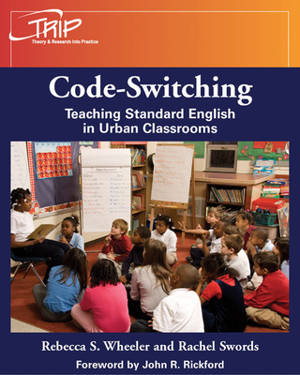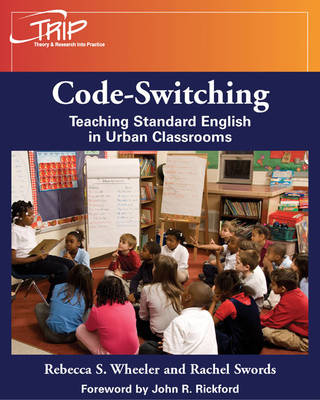
- Retrait gratuit dans votre magasin Club
- 7.000.000 titres dans notre catalogue
- Payer en toute sécurité
- Toujours un magasin près de chez vous
- Retrait gratuit dans votre magasin Club
- 7.000.0000 titres dans notre catalogue
- Payer en toute sécurité
- Toujours un magasin près de chez vous
50,45 €
+ 100 points
Description
Wheeler and Swords show K-6 teachers how to use code-switching and contrastive analysis to help students use prior knowledge to translate vernacular English into Standard English. When African American students write or say "Mama jeep is out of gas" or "The Earth revolve around the sun," many teachers--labeling this usage poor English or bad grammar--assume that their students have problems with possession or don't know how to make subjects and verbs agree. Forty years of linguistic research, however, demonstrates that the student is not making errors in Standard English--the child is writing or speaking correctly in the language patterns of the home and of the community. Building on the linguistic knowledge that children bring to school becomes the focus of this book, which advocates the use of "code-switching" to enable students to add another linguistic code--Standard English--to their linguistic toolbox. Rather than drill the idea of "Standard English" into students by labeling their home language as "wrong," the authors recommend teaching students to recognize the grammatical differences between home speech and school speech so that they are then able to choose the language style most appropriate to the time, place, audience, and communicative purpose. University researcher Rebecca Wheeler and urban elementary teacher Rachel Swords offer a practical, hands-on guide to code-switching, providing teachers with step-by-step instructions and numerous code-switching charts that can be reproduced for classroom use. The success of Wheeler's presentations in urban school districts and the positive results that Swords has observed in her own classroom speak to the effectiveness of the research and of this approach. While the book focuses on language use in the elementary classroom, the procedures and materials introduced can be easily adapted for middle and high school students.
Spécifications
Parties prenantes
- Auteur(s) :
- Editeur:
Contenu
- Nombre de pages :
- 197
- Langue:
- Anglais
- Collection :
Caractéristiques
- EAN:
- 9780814107027
- Date de parution :
- 10-04-06
- Format:
- Livre broché
- Format numérique:
- Trade paperback (VS)
- Dimensions :
- 203 mm x 254 mm
- Poids :
- 453 g

Les avis
Nous publions uniquement les avis qui respectent les conditions requises. Consultez nos conditions pour les avis.






